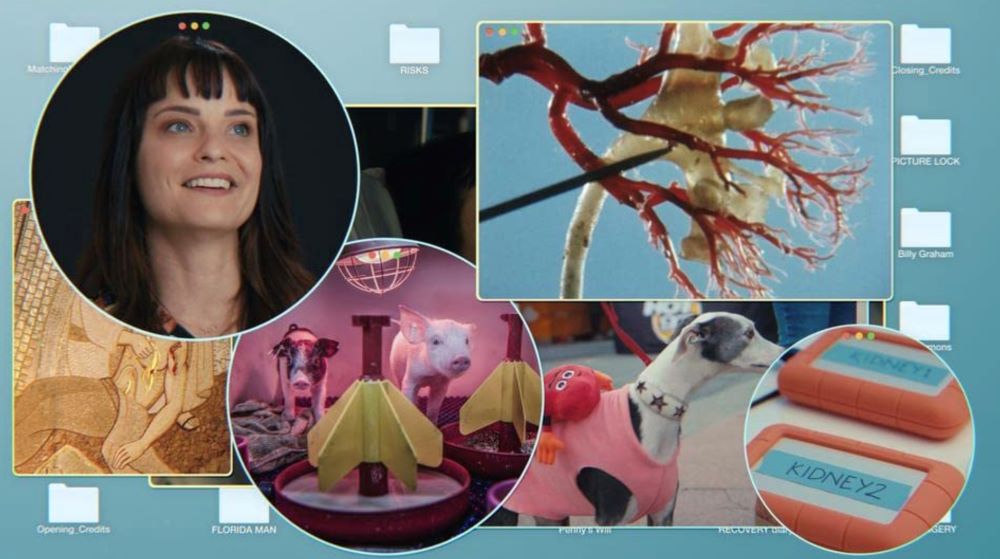It’s that time again. ’Tis the season of documentaries. Hot Docs in Toronto is underway and DOXA in Vancouver is about to be loosed upon the world. Once again, DOXA is plying the non-fiction waters with a deluge of features, shorts and industry events. It’s a broad spectrum of offerings, from the highly experimental to more accessible fare.
Here’s a few, only a few mind you, of the documentaries to watch at this year’s festival.

Confessions of a Good Samaritan
Filmmaker and 2020 Guggenheim fellow Penny Lane’s decision to donate a kidney to a complete stranger was a choice that long preceded her decision to make a documentary about it. But this one act of altruism took her to unexpected places.
On the surface, Lane’s journey into the world of altruistic organ donation is just that: a perambulatory, circuitous trip into the complexities of the procedure. But in the process of trying to understand not only her own motivation but the very idea of altruism itself, raw and occasionally unflinching questions about what we owe to each other begin to surface.
The history of organ transplants has long been fraught. The first successful kidney transplant took place between two identical twins. But once the problem of organ rejection was conquered and people were able to donate kidneys to strangers, other issues arose, namely those of legality and ethics. Bioethicist Jacob Appel, a jocular fellow, provides one of the most charming interviews as he explains the legal ramifications of organ donation.
In addition to Appel, Confessions is populated by fascinating folk on both sides of the medical front. The narrative provides time to doctors, scientists and researchers actively working towards the betterment of human health but it also platforms average folk, including a number of donors who acted out of the simple impulse to do good. But just how simple is that impulse? Turns out not that simple at all.
Dr. Abigail Marsh’s early experience is a case in point. After a good Samaritan rescued her in a traffic mishap, this potentially deadly situation turned into a life-long fascination with what makes some people help others. Marsh’s research into the role of the amygdala reveals that the bigger the clusters of nuclei, the greater the empathy that people feel for the plight of others. Conversely, the smaller this bit of the brain structure, the more likely it is that people are prone to psychopathy.
Surgeon Keith Melancon from George Washington University details his childhood ambitions to become a physician as a preface to his current role as a transplant specialist. As he explains in an interview, the chasm between the number of kidneys available and the number of people who need a transplant is enormous. Given the ratio, there is little chance of altruistic donors ever meeting the need. While medical science continues to search for solutions, such as 3D organ bioprinting as well as animal-to-human transplants, many thousands of people will die waiting for donations.
In the face of ongoing divisiveness and arguably selfish behaviour on a societal level, this film comes at a curious moment. Confessions could easily have gone off the rails in a few different ways. But to her credit, Lane asks herself the hard questions, tackled with her usual blend of sparky humour and ferocious intelligence.
As the countdown to her surgery approaches, Lane keeps a journal of her anxieties, misgivings and fears. It is the internal battle that proves one of the most compelling aspects of the film, as the filmmaker must finally face the reality of her decision to help someone she doesn’t know and will probably never meet.
What happens, you ask? Go and see the film, I answer!
Satan Wants You
If you needed any more convincing that there’s a Satanic sucker born every moment, this sleek beast of a documentary is just the ticket.
Vancouver Filmmakers Sean Horlor and Steve J. Adams tell one heck of a story charting the rise and fall of Michelle Remembers, a shocking confessional published in 1980.
Co-authored by its main characters, Michelle Remembers details the story of Michelle Smith, whose recovered memories involved being gifted to local Satanists by her mother when she was five years old. At the time of its publication, the book was marketed as a true story from real life. The plot begins innocently enough, when Victoria-based psychiatrist Larry Pazder began treating Smith for depression after she suffered a miscarriage. But in the course of her therapy, something else surfaced.
In her sessions, Smith maintained that she had been subjected to ritualized torture — eating babies, being buried alive in Ross Bay Cemetery and various other devilish activities — until she was rescued by the timely intervention of the Virgin Mary. The book hit the bestseller list, the Vatican got involved and the pair — who eventually married — went on the daytime talk show circuit. Hola, Satanic Panic!
Perhaps the most egregious perpetrators aren’t the unholy couple at the centre of the story, but the media folk who were only too happy to promote Smith’s story — largely uncritically.
Even the most hard-bitten journalists like famed Canadian broadcast journalist Jack Webster failed to question the more fantastical elements of the tale.
When the Church of Satan sued for defamation, subsequent editions of the book removed some of the more lurid aspersions levelled against the devil worshippers. Note: if you fall on the wrong legal side of Satan, you know you’re probably not doing the Lord’s work.
Despite the book’s ludicrous premise, the real-world repercussions turned out to be tragic. As the panic picked up, a series of criminal cases resulted in innocent people being sent to prison after being accused of the most heinous acts imaginable.
Closer to home, the relationship between Smith and Pazder effectively devastated the people around them, including Pazder’s ex-wife and children. The film combines archival footage with never-before-heard audio recordings of the therapy sessions that kicked off the devilish fury. It’s the personal repercussions that resonate, with Pazder’s first wife Marylyn providing some of the film’s most startling details.
As more than one interviewee notes, everything old is new again, as baby-eating-devil worshippers are back again in the form of Pizzagate and QAnon conspiracies.
A ridiculously entertaining film, Satan Wants You might just inspire some sympathy for the Devil.
Big Fight in Little Chinatown
Across North America, Chinatowns are under threat. This is not news to anyone living in Vancouver, but director Karen Cho takes a broad lens to many of the endemic issues while staying close to the personal, often deeply emotional reactions that people have to losing their homes, livelihoods and memories.
The rapacious scale of development that threatens communities in urban centres like Toronto, New York, San Francisco and of course Vancouver is only one aspect of the film. While the current real-estate frenzy that is consuming neighbourhoods across the continent provides the lion’s share of the drama, the history of diasporic communities is also carefully explored.
Strenuous, often nefarious campaigns designed to force people out have been around since the beginning of Chinatowns themselves. In the case of New York City, it’s an enormous new jail situated immediately beside an elderly care facility that brings about protests from the community.
The pandemic arguably exacerbated many of the issues that have contributed to the ongoing attrition of Chinatowns across North America. Restaurants were forced to close. Small businesses like New York’s Wing on Wo & Co housewares emporium shuttered their doors.
While many similar experiences are shared in different cities, Vancouver’s Chinatown is beset with a particularly challenging reality. Sharing space with the Downtown Eastside, local businesses contend with rising levels of violence and despair. But as William Liu of Kam Wai Dim Sum on East Pender Street notes, his elderly father isn’t afraid of drug users, who he says are mostly non-violent. It’s the angry white people who he says are the most frightening.
The pathos at the centre of the film is hard to deny, as people whose family and workplaces are all structured and embedded within a few city blocks face the potential loss of their history and community. But this is not a film without hope, as people come together to find ways of supporting each other.
The film is filled with a variety of fascinating folk, including Liu, who gives up his career as an opera singer to help out his family restaurant in Vancouver, and Danny Quon from the Hon Hsing Athletic Club.
Whether it’s lion dancing, dim sum or the layers of shared history maintained in Chinese Benevolent Society buildings, the resistance has taken on new lease on life.
Twice Colonized
At age 11, Aaju Peter left her home village in Kalaallit Nunaat (Greenland) and travelled to Denmark, where she started school, living with a series of different families. As she learned to speak Danish, she gradually lost her own culture and became assimilated into the dominant Western society. When she finally returned to her community at age 18, she felt like she no longer belonged.
When Peter moved to Canada, a similar process took place. Hence the film’s title.
A remarkable mixture of the personal and the political, Twice Colonized encompasses many of the issues that Indigenous women continue to face: violence, despair and the continuing repercussions of colonialization. Director Lin Alluna takes an observational approach, following Peter as she returns to Denmark. Parts of this reunion are happy (meeting up with old friends), while other aspects contain darker elements. As she explains in one scene, even speaking Danish again summons up the suffering and anguish from her past.
After being called to the bar in 2007, Peter started her law career fighting for the rights of Inuk people to continue the traditional seal hunt. Through her work as a lawyer, she continued to work for reparations from both Denmark and Canada. As Peter and other Indigenous women from around the globe meet in the service of establishing an Indigenous Forum at the European Union, there is an indication that things are changing on a larger scale.
While it’s sometimes a little unclear in terms of its timeline, the magnetic centre of the film is never in doubt. Peter radiates power even in the midst of despair and uncertainty. After a lifetime of contending with hardship and tragedy, the suicide of her youngest son and the violent dissolution of her current relationship take a brutal toll.
When her former romantic partner shaves Peter’s head in an effort to shame her, it has the opposite effect. Peter embraces her short hair as a ritual shedding of the old. She moves forward, a radiant and resilient force of nature.
Kite Zo A (Leave the Bones)
Kaveh Nabatian’s thrilling film combines dance and politics into a furious conflagration that is equal parts history, observational documentary and something more ineffable. The result is an experiential film that defies easy classification.
The history of Haiti is more than enough for a couple of films, but Nabatian takes an interesting approach, allowing musicians, dancers, rollerbladers and fishermen, who all seem possessed of an innately poetic nature, to give voice to the intricacies of Haiti’s past and future. Sometimes, it is the strangest of occurrences that result in new cultural manifestations.
One example: when rollerblades flooded Haiti, after the fad died off in other parts of the world, Haitians took up the sport and recreated it in their own inimitable fashion. As one wry interviewee notes, a number of people died in the process. One man ran into the back of a truck. But what arose out of people’s embrace of the trend was an altogether curious melding of performance, athleticism and the pure unfettered joy of movement. Scenes of young men clustered thick and fast on the back of a lorry van, allowing it to pull them along narrow city streets, are heart-stopping in their risky beauty.
Another compelling aspect of the film are the dance performances. Embedded in the centre of the narrative, they rear up and out in spectacular fashion, fashioned from sweat, heat, music and an unmistakable spirit conjured up from the country’s tumultuous past and present.
What the film captures in images are as startling as they are beautiful. There is a visceral feeling of the place — dust, ocean and sky. In scenes of fishermen plying their trade, the camera dunks in and out of the blue green water, like a seal.
It is only one small moment in the tapestry of different experiences, woven together, but it leaps out for its utter sensorial beauty.
The DOXA Documentary Film Festival is online and in Vancouver from May 4 to 14, 2023. ![]()
Read more: Film
















Tyee Commenting Guidelines
Comments that violate guidelines risk being deleted, and violations may result in a temporary or permanent user ban. Maintain the spirit of good conversation to stay in the discussion and be patient with moderators. Comments are reviewed regularly but not in real time.
Do:
Do not: